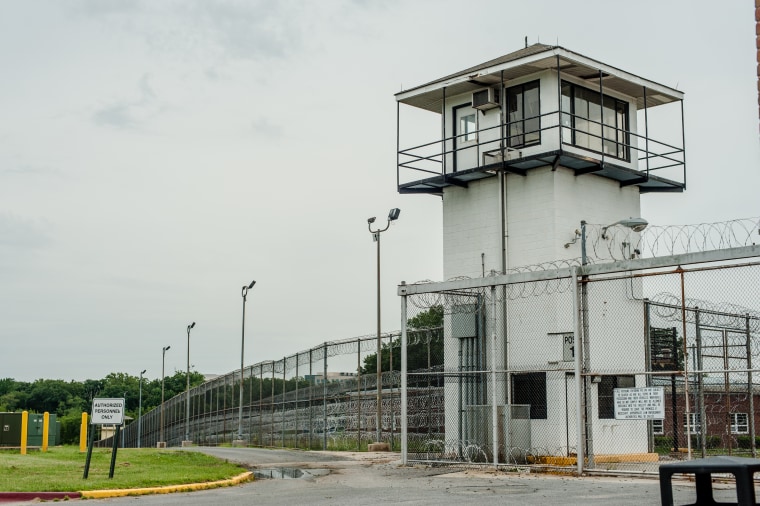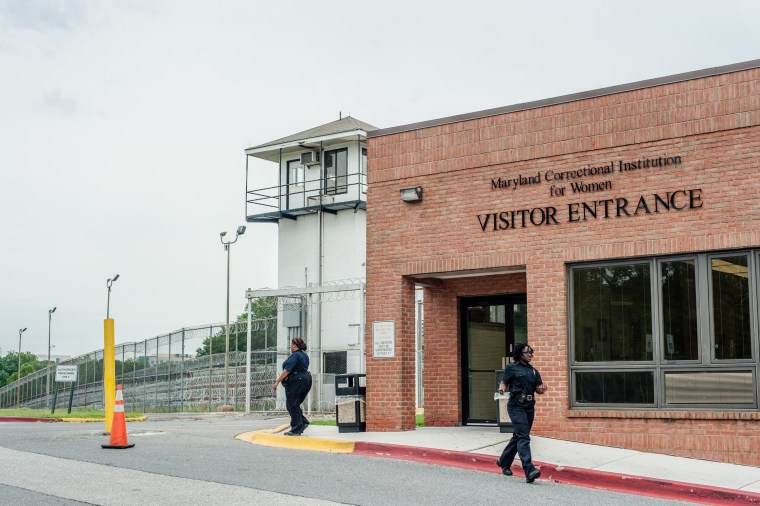A newly filed federal lawsuit is bringing additional attention to the issue of juvenile “lifers.”
The American Civil Liberties Union (ACLU) of Maryland filed suit on April 6 in U.S. District Court in Baltimore, on behalf of the Maryland Restorative Justice Initiative, a prisoners’ rights organization. Also named as plaintiffs are three men--all in their 50s--who are currently serving mandatory life sentences after being convicted of crimes in their teens.
The legal complaint contends that Maryland’s current sentencing and parole system is unconstitutional, condemning juveniles to spend the rest of their lives in prison with no meaningful chance for parole and “without adequate consideration of their youth status.”
“This pertains to young people in Maryland whose cases have been tried in the adult criminal system--typically for fairly serious crimes,” said Sonia Kumar, an ACLU attorney who is working with pro bono lawyers and fellow staffers on the case.

“For decades, [the state] has denied any hope of release to juvenile lifers who have matured, done everything within their power to reform and tried to demonstrate their rehabilitation. The Constitution says they deserve a second chance at life outside prison walls.”
Maryland is one of only three states nationwide (including California and Oklahoma) that require “executive clemency”—meaning that the governor must personally approve parole for anyone serving a life sentence.
According to the filing, which names Maryland’s governor and state officials as defendants, more than 200 individuals in its state penal institutions are serving parole-eligible life sentences for offenses they committed as minors. Most were reportedly sentenced under mandatory guidelines in which judges were not required to consider age.
More than 200 individuals in Maryland state penal institutions are serving parole-eligible life sentences for offenses they committed as minors.
Although the plaintiffs are serving “life with parole” sentences, the suit argues that under the present system no “juvenile lifer” has received parole for the past 20 years.
“We are not asking for anything more than the law and basic fairness require,” said Walter Lomax, executive director of the Maryland Restorative Justice Initiative, and a former lifer himself.
Men and women sentenced as juveniles are not necessarily the same people today that they were decades ago, he said. Many have served 30 or 40 years or more, and have demonstrated growth and rehabilitation. “They have progressed and matured and deserve meaningful consideration for parole, not a system in which no one is paroled regardless of his or her merit.”
Among the plaintiffs in the Maryland case is Nathaniel Foster, who was 17 when he received a mandatory life sentence in 1983 for his involvement in a failed robbery attempt that led to someone’s death.
At the time, Foster had no prior criminal record, was a high school graduate and was preparing to enroll in college. At sentencing, the judge in his case said he had no latitude to impose any other sentence.
Foster is now 50-years-old. His lawyers say he has never had a violent infraction during three decades plus of incarceration; has earned stellar reviews as an employee from his supervisors, and has served as a mentor and volunteer providing hospice services to ailing prisoners. Despite that track record, Foster has never been recommended for parole.

“I helped raise Nathaniel and now I feel so powerless, because it seems like he’s never going to get out,” said his aunt, Brenda Allen. “He has worked so hard…. I don’t know what else Nathaniel can do to prove he’s ready to return to society. I’m sorry for what happened. But he was just a kid himself.”
A national issue
Data varies, but it's estimated that anywhere from 1,300 to 2,600 individuals in prisons across the country are serving life for crimes they were convicted of as minors. African-American youth are disproportionately impacted.
A 2012 report by The Sentencing Project showed many of the juveniles impacted had at some point in their lives witnessed violence at home, suffered abuse and were socioeconomically disadvantaged. For instance, 31.5 percent had grown up in public housing.
RELATED: White House Summit Focuses on Women in Prison
In the past decade, the U.S. Supreme Court, joined by other state and federal courts around the country, has ruled in several cases that the Eighth Amendment— which prohibits “cruel and unusual punishment”—forbids condemning minors to the most serious penalties for crimes due to age.
The high court, drawing in part on a growing body of neuroscience relating to adolescent brain development, has noted that youth are more likely to make rash decisions due to lack of maturity, can be especially vulnerable to external forces, and are, by definition, still developing.
As such, the Supreme Court has ruled that children are “constitutionally different” from adults and should not be subject to the nation's harshest penalties.
It's estimated that anywhere from 1,300 to 2,600 individuals in prisons across the country are serving life for crimes they were convicted of as minors.
The Eighth Amendment bars life sentences for all juveniles other than the “rarest” juvenile offender “whose crime reflects irreparable corruption,” the court has said.
Plaintiffs in the Maryland lawsuit allege the state has not adhered to this constitutional rule in either sentencing or parole decisions. State officials have indicated that they are reviewing the suit.
“This second chance, this hope of redemption that the decisions of the Supreme Court promise young people, is all our clients ask,” said Kumar of the ACLU.
Advocacy and opposition
Groups such as the Equal Justice Initiative, Justice Roundtable, and the Campaign for Fair Sentencing are among those advocating for youth around this issue.
Lawmakers nationwide are taking action, and a growing number of states across the U.S. have recently passed legislation barring the practice of sentencing children to life in prison without the possibility of parole. Utah recently became the second state to ban the practice this year, following South Dakota. They join other states including Wyoming, Nevada and West Virginia in implementing less punitive accountability measures for children.
This law brings to 16 the number of states that ban life-without-parole sentences for people who were younger than 18 at the time of their crimes. In five other states, life without parole is banned for juveniles under most circumstances.
RELATED: This Entrepreneur Found The Prison to Wealth Pipeline
“By banning life without parole for children, Utah policymakers affirmed that we are all more than the worst thing we have ever done,” said Jody Kent Lavy, director and national coordinator at the Campaign for the Fair Sentencing of Youth. “Rather than sentencing them to die in prison, we should hold children who commit serious crimes accountable in ways that account for their age at the time of the crime, relevant childhood experiences, and their capacity for change.”
But victims advocacy groups such as the National Organization of Victims of Juvenile Murderers say they are committed "to making sure that it is the victims and not just the offenders that are the focus of any conversation about teen violence," according to the organization's website. The site also notes, "We do not support over-sentencing of offenders or conviction of the innocent."
The issue of juvenile lifers has attracted attention via social media and in the digital sphere. A petition is currently circulating on Change.org for Davontae Sanford, a partially blind, developmentally disabled young man who was sentenced to 39 years for a crime his supporters say he did not commit.
"I don’t know what else Nathaniel can do to prove he’s ready to return to society. I’m sorry for what happened. But he was just a kid himself."
In 2007, Sanford—then 14-years-old-was interrogated by police after four people were murdered in his Detroit neighborhood. He was questioned twice without the presence of his parents or an attorney. In the second of his two statements, he reportedly implicated himself as one of the shooters, but later told a psychologist that he had made it all up because the police had told him he could go home if he would “just [tell] them something." Several media reports say that someone else has confessed to the crimes.
A petition for Sanford has garnered more than 96,000 signatures to date.
“We see petitions starters declaring victory every day and criminal justice reform in particular is one of the most popular issues,” said Jon Perri of Change.org. “Each month there are hundreds of thousands of signatures on criminal justice petitions with topics like sentencing reform, clemency for nonviolent drug offenders, and wrongful convictions.”
Sanford is now in his early 20s, and has served nine years; his lawyers are reportedly pursuing a new trial.